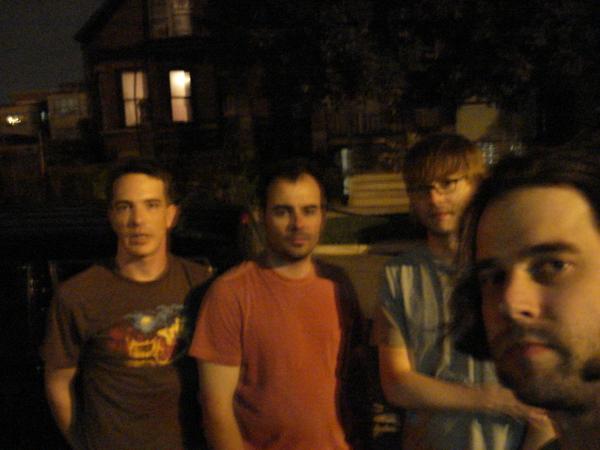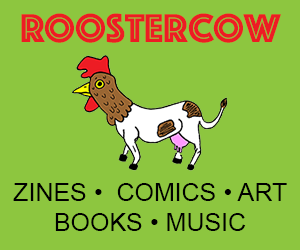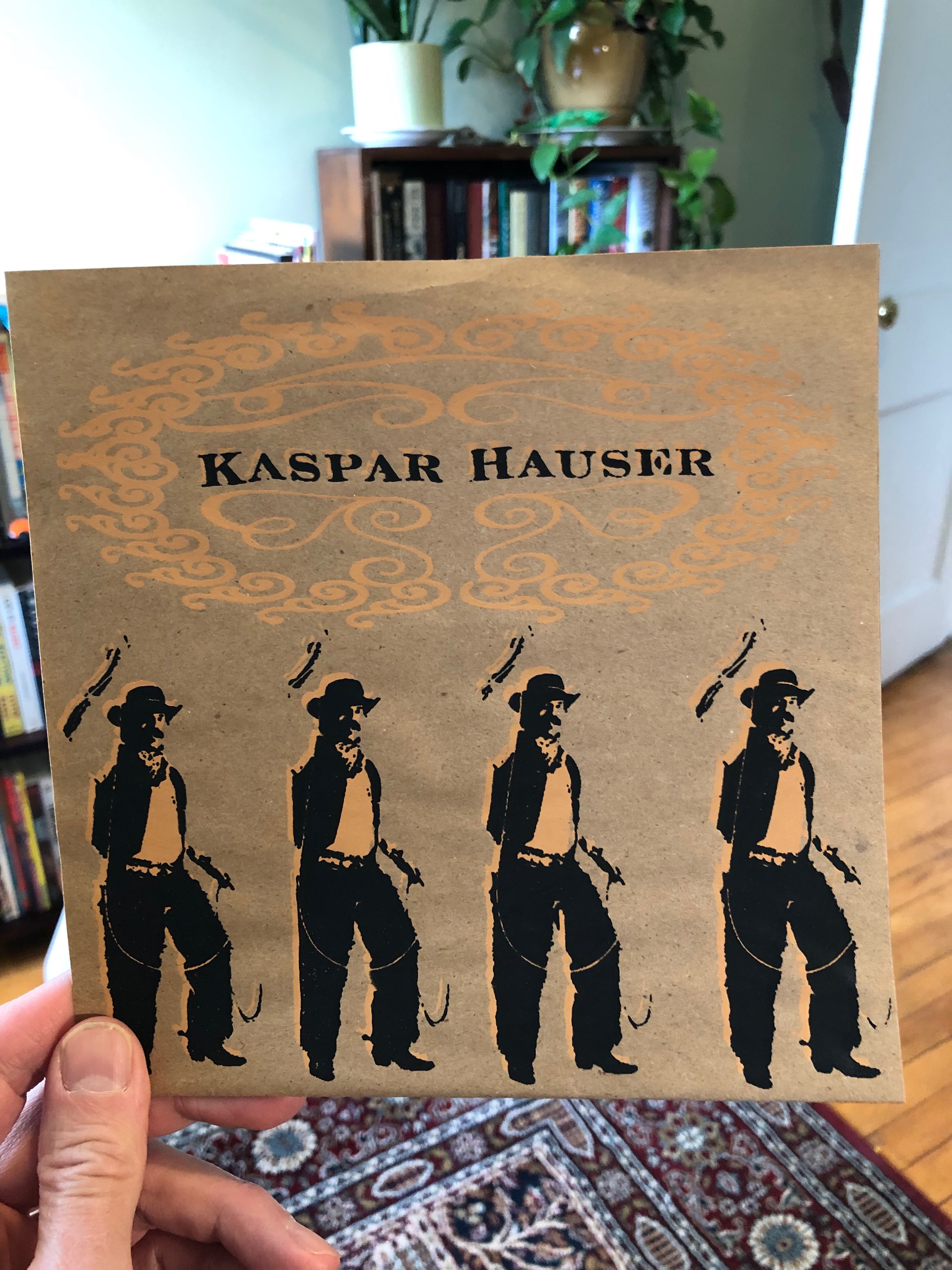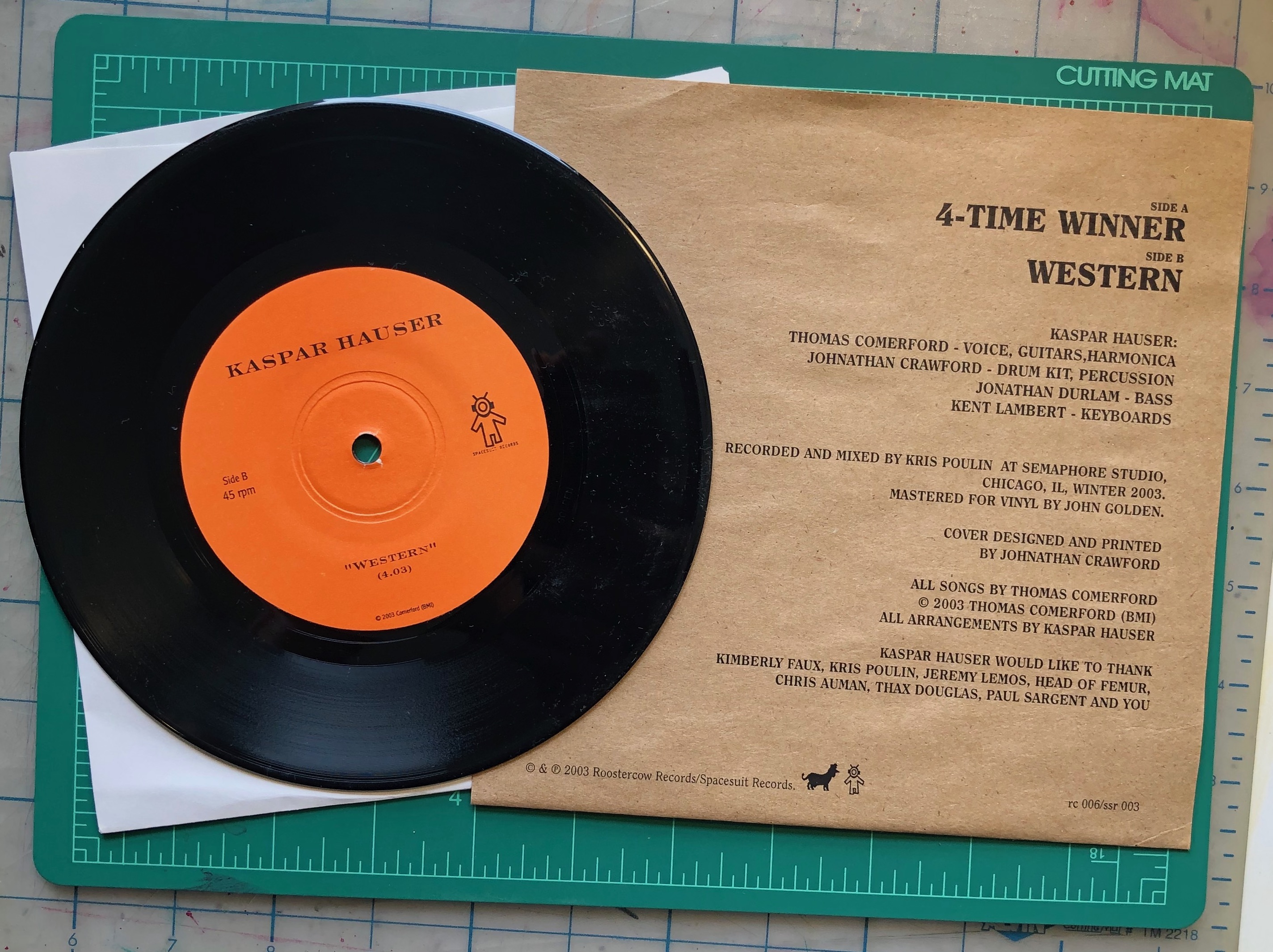 
  
An interview with Thomas Comerford of Chicago band
Kaspar Hauser
Published 2011

Tom Comerford is a Chicago musician and filmmaker who is also an adjunct professor at the School of the Art Institute of Chicago. I’ve known Tom Comerford for almost as long as he's been in town. Our bands have played a few shows together over the years; he in Kaspar Hauser and myself, more recently in Soft Targets but also in RNCD—in fact, Kaspar Hauser is now in possession of former RNCD drummer, Steve Kiraly. I also worked with Tom on a release of a Kapsar Hauser single for RoosterCow/Spacesuit Records in 2002. It may also be worth mentioning that I did a very brief stint in The Hauser as a second guitarist in the fall of 2006. As a result, I am hardly what you would call an objective journalist (or a journalist at all for that matter).
Having divulged my personal relationship with Kaspar Hauser, let me also confess that I am a fan of the band, both live and on record. There was much about the band and Tom's history that I did not know, however. To remedy this ignorance on my part, this past November Tom and I met for dinner at Noon O Kabob in Albany Park where we discussed stuff in general and things in particular.
NEW: Read a 2023 interview with Thomas Comerford.
Buy the "4-Time Winner" b/w "Western" 7" single from the RoosterCow Store!
RW: How did your recent tour go?
TC: We went out on three different occasions this fall hitting Midwestern locales. Basically between the end of September to this last thing, we did Cleveland, Athens, Ohio, Iowa City and Madison. Iowa City was great, actually they were all really great except for Madison. Madison was no good.
RW: Not a big turnout?
TC: Yeah, pretty bad turnout, it was a Sunday night, I’m sure that had something to do with it. The one guy on the bill—that we got hooked up with through sort of a friend-of-a-friend type thing—was fairly new in town, so he doesn’t know many people there. I don’t know where this other band came from but it was—it was interesting. I won’t name names, just to protect the innocent. The High Noon Saloon is a great place but the bartender was indicating that even their big name shows, they’ve not been doing well with attendance.
RW: Is Madison not into the rock anymore?
TC: That could be. St. Vincent—might be from Montreal or Europe or something—she had been there on Friday night and I was under the impression that the kids who read Pitchfork like her. Nobody came out to see her either. So I’m told. Iowa City for some reason, and it almost has nothing to do with the fact that I lived there because the people that come out and see us there, I hardly new any of them when I lived there. That show was really fun. It was at this place called The Mill that we’ve been liking when we go out there.
RW: Did Kaspar Hauser start in Iowa City?
TC: Yeah, it actually did, but maybe only three people knew that when it happened.
RW: They didn’t know they were in Kaspar Hauser?
TC: (laughs) Everybody who was in it, didn’t even know it because it just started as a 4-track thing, because I had had a band when I was there called Liar Mouth, but it was very casual to the point of being non existent. I was one of two songwriters in the band. Some of the material that became Kaspar Hauser songs were actually played by that band. That band only played maybe three shows in a span of three years, so casual was the operative word, but I got fed up with the band format interestingly enough. So I bought a 4-track and I just started recording my songs on my own and enlisted two other people to do things on a handful of songs. It was mostly acoustic guitar and voice and I would sometimes overdub additional guitars and instruments myself.
RW: You were the only one to move here from Iowa City to restart the band?
TC: Aside from my wife who was not in the band at any point.
RW: How long have you been married?
TC: I celebrated ten years of marital commitment on August 7th of this year.
RW: And how long have you been in Chicago?
TC: Ten years. We got married right before we moved to Chicago.
RW: Why did you move to Chicago, for your work or hers?
TC: Mostly hers. She got a job here before I did, but before we moved here I found employment, so it worked out. My main gig has been teaching film production at the Art Institute and I’ve been doing that for ten years.
RW: Did you go to film school?
TC: In Iowa City, I got a Masters of Fine Arts in Film Production and I’m not sure what that means exactly. It means I’m qualified to teach college.
RW: Do you have a new film coming out or being screened?
TC: Yeah, it’s coming out in February, I put it off as long as possible. They were asking for it this summer. I kind of owe it to the school because they gave me a paid semester off.
RW: With the idea that you would make a film?
TC: That I would finish it. I started making it in 2005 and then I had a kid, things have been kind sort of crazy.
RW: Indian Boundary Line is the name? What’s it about?
TC: My films aren’t really influenced that much by movies as much as landscape photography. They’re kind of quiet and not much happens in them.
RW: And there’s a soundtrack but you’re not doing it.
TC: There’s supposed to be a score. I’m not sure what’s going on with that right now. This guy, Toby Summerfield, he’s a pretty skilled player and composer—I think Algernon is one of his bands—he’s the kind of musician who can play whatever he wants.
The reason I asked him to do the score is, he has this group called Never Enough Hope, that he basically writes music for and he conducts them. It’s like a twenty-two piece outfit that has drums, bass, electric guitars, a big horn section and a big string section and I think when this score thing happens—and it needs to happen soon—I think it will be a three instrument thing. I don’t know how to describe it, I don’t know if you ever saw Godspeed You Black Emperor, but not nearly as theatrical as that.
There’s a lot of stuff going on but I find it pretty compelling. The stuff for the movie is going to be a bit more low key than that. I’m devising a soundtrack myself of all the spaces that you’re looking at and the sound events that are happening in the spaces and there are a number of voices reading these various found pieces of text that are from different points of time.
RW: Did you film it here in Chicago?
TC: Yeah, there’s a road near my house called Rogers Avenue and learning about that road inspired that movie, because that road—it’s broken up in Chicago, but it follows what was a treaty boundary in 1816 between the United States and the Native Americans who were living here. The movie is about the landscape along that former treaty boundary. It’s an attempt to look at the landscape and see how that history plays out in the landscape. There’s no plot, there are no characters. I think it’s interesting, but you know...
RW: We’ll find out.
TC: (laughs) Yeah, we will.
Tom's film, The Indian Boundary Line is screening February 4, 2010 at the Gene Siskel Film Center, 164 N. State St., Chicago, IL, 6pm.
RW: How many films have you made?
TC: I don’t know. I made a lot of Super 8 movies in the early nineties that I lost track of. I think I made at least three or four, then when I moved to Iowa, I started doing a lot of sixteen millimeter films. My progress has slowed down—if it even is progress—my production has slowed down over the years because I’ve gotten a lot busier with Kaspar Hauser.

RW: So you’re focusing more on music now?
TC: In general. I’m obviously interested in movies and my work involves that arena—although, I am teaching a punk rock history class.
RW: Yeah, what’s that about, where do you start, what’s day one?
TC: Basically, I start by talking about underground rock. That to me is 60s garage and the Velvets. That’s the starting point and then I try to take the scene-based approach; Cleveland, New York, San Francisco, L.A., London, Manchester, Leeds. Since John Langford is here in town, I bring him in. He talks about Leeds skinheads beating people up.
RW: Was this a class you had the idea for or did they (SAIC) ask you?
TC: I created it because I felt like the kids didn’t know shit about music that I thought was pretty important. I thought, this is art school, how come these kids don’t know about this stuff? In one class I was talking about Cleveland punk, which is where I mostly grew up. I was born in the South and spent some formative years in Richmond, Virginia. I moved to Cleveland when I was six, that was contemporaneous with Pere Ubu 1976, but I didn’t find out about (the Cleveland scene) until I was in high school.
RW: You didn’t hang out with Peter Laughner.
TC: No, he died in ‘77, but Pere Ubu reformed in ‘87 so I would see them a couple times a year.
RW: I got to see them within the last ten years, I think.
TC: At the Double Door show, how was that?
RW: I didn’t have as full an appreciation as I have now.
TC: I have all their stuff but I really get tired of the band when David Thomas takes over, which started to happen in New Picnic Time.
RW: He was being a bit of a prima donna at the show because he was having problems with the sound or his microphone.
TC: He’s pretty much a jerk, that’s been my experience.
RW: He was in a little snit.
TC: He’s often in a snit. He’s still really great as a performer. To me one of the best things about the band on the first couple records is Tom Herman, the main guitar player. They sort of squeezed the guitar out more or less and they got this guy in the late ‘70s, Mayo Thompson, who played in the Red Crayola and that stuff’s kind of interesting but I don’t know if I’d call it rock music.
Tom Herman is a great rock guitar player, I thought it made for a real interesting sound to have his guitar up against the weird synth stuff that was goin’ on and they had a great bass player Tony Maimone, who played on some Bob Mould records in the late ‘80s.
 
RW: Have you seen that movie, You Weren’t There?
TC: I’ve had those guys to the class, Joe (Losurdo) and Chris (Tillman), they’ve done it twice—I’ve done the class three times—and one time a bunch of people were in the movie came too, John Haggerty from Pegboy and Naked Raygun. John Kezdy from The Effigies came, of course a lot of the kids get turned off by that movie because of the end—the grumpy old man part where there complaining about...
RW: The kids today...
TC: The kids today don’t know what it means to be punk.
RW: I saw that movie screened at Portage Park and there were a lot of punk rock kids there, I think from Pilsen—there’s a Mexican punk rock/hardcore scene down there—and there was some booing when the drummer from Rights of the Accused said that very thing.
TC: Get your own fucking scene?
RW: I think he said something like ‘we meant it back then, they don’t mean it now.’
TC: That’s a pretty presumptuous thing to say. Any kind of music can mean anything to anybody. The Beatles still mean something to people.
RW: When did you start playing guitar?
TC: I started playing when I was ten. My mom was playing banjo at the time.
RW: Did she force you to back her up?
TC: That was sort of the idea, that she would have someone to play with, but I didn’t take it very seriously. I didn’t really practice. I took lessons for awhile and I was really only interested in learning songs that I liked, but my guitar teacher was trying to teach me these jazz songs, so I was half-heartedly learning these weird chords and in high school it kind of petered out.
It would have been good if I had fallen in with some music types, but high school was kind of a drag, and I was really stressed out most of the time and trying to be good at sports. I stopped playing guitar basically. When I went to college, that’s when I started playing and writing my own songs.
RW: Was that a deliberate thing or something you found out you could do by accident?
TC: Writing songs? I’m not sure why I started. Even then I was really uncomfortable with the idea of performing in front of people or even having my songs recorded and played for other people. It was just something I did ‘cause I really liked doing it and only my closest friends would get a tape of the songs. So not much has changed, basically. I was still somewhat Catholic at the time and I played guitar for the church service on Sundays throughout college. Then I joined a neo-hardcore outfit.
RW: Sounds like a good transition. This was in Iowa City?
TC: No, this was in upstate New York, this was undergrad.
(The conversation turned to talk of hardcore bands and followed that direction for awhile. You, the reader, may or may not interested in this subject but it has been omitted without consideration for your feelings one way or another.)
TC: So that was my short-lived hardcore experience. I moved to Boston after that and I started a band that was truly gonna be for my songs.
RW: What was that called?
TC: Molly Beagle. That was an outgrowth of a four-track thing I was doing with a friend at the time. Then I left upstate New York, but my friend, he would come out to Boston and we would work out our songs and while he was away I recruited these two gals who didn’t know how to do anything but I taught them how to play bass and drums or as much as I could know about such things which wasn’t much.That was the first band thing that I really got excited about. It ended up falling apart after about a year but that experience pushed me to try to take it a little more seriously.
RW: So you went from Boston to Iowa City?
TC: Vegas.
RW: What happens in Vegas stays in Vegas. What happened in Vegas?
TC: A lot of stupid stuff. I got persuaded by Paul Sargent to move to Las Vegas so the bass player from my band, Lori, and Paul and I moved from Boston to Las Vegas and I did start a little band there, this duo with this gal, but she wrote most of the songs. And I did a couple of my songs with her but for whatever reason I didn’t want to push it. I didn’t feel totally confident about writing stuff. But we put out our own cassette, her name is Jay. She was in the same circle as we were. My scene there was centered around the record store called Benway Records, which was great—run by this guy Ron Benway.

TC: When I started Kaspar Hauser and moved to Chicago, it was the first time things gained critical mass of any kind. For one reason or another, it just started happening.
RW: How did you hook up with Kris Poulin?
TC: He was living in the same house as Paul when I moved here. I had recorded that stuff and I was planning on putting it out as a CD-R and I think Kris heard it and thought it was cool and I was like, hey let’s do a show, you wanna play guitar and he said sure. So I got a show at the Empty Bottle. It’ll be ten years ago in June that Kaspar Hauser as a live performing entity, began it’s run.
RW: How many different members?
TC: (Laughs)
RW: A dozen at least.
TC: I don’t know, you were in Kaspar Hauser for about a month.
RW: A month possibly, maybe six weeks. Never got to do a show though.
TC: You’re not alone in that statistic. We just had a bass player come and go in the last three weeks.
RW: What happened to Matt ? (bass player), is he just too overbooked?
TC: Matt doesn’t want to play bass anymore. He wants to play guitar and it seemed like a good time to do the switch.
RW: But he’s going to stay in the band.
TC: Yeah. The idea was, my friend Chris Sherman who’s in the band Fruit Bats, asked me at one point, I am interested in playing in Kaspar Hauser, can we do it? And I was like, I’m not sure what you would play, maybe baritone guitar... I was trying to figure it out and when I told Matt he was like, that would be great ‘cause I don’t want to play bass anymore. That was tied into the idea that we were starting to work on all these new songs and Matt wanted to come up with guitar for those songs as opposed to bass. But, by and large, it will be a new formation with the same members but the bass player, he just had a kid—
RW: He didn’t last as long as I did. At least I don’t have that record.
TC: Nope. Two practices.
RW: So now you don’t have a bass player.
TC: Yes, we are looking for a bass player. There’s no rush right now, ‘cause we’re taking a little break. I’m trying to finish up my film stuff.
TC: I’ve never quite figured out what Kaspar Hauser is but I might do some solo stuff. Not solo acoustic but solo where I’ll play with whoever and not have it be Kaspar Hauser. like somehow that would be different, I don’t know how.
RW: Do you feel restricted by Kaspar Hauser, do you feel like there’s something you want to do that you can’t do with the band?
TC: Yeah, I think that’s true. It’s become more of a band than it’s ever been. Steve (Kiraly, drums) and Matt have been playing with me for two years now and we play together well I think. We don’t always get along—
RW: Do tell.
TC: —but, you know, we play pretty well together and I’m interested in preserving that, and I’m still interested in bringing people in to do things for records like I have but if I wanted to do something along the lines of what I used to do in Kaspar Hauser, I would feel like I would do something else if it were more of a singer songwriter thing than having a session where you just have people show up and give them charts and they play the songs. I’m interested in that kind of musical approach also, but I really like how Kaspar Hauser feels like a band and I’m the songwriter in that band but they’re making contributions to decisions about, should we change that part a little bit or that’s not working.
RW: You do like that?
TC: Yeah, I haven’t always, but I like the way it seems to be going right now. So it’s interesting the way things have changed.
RW: Do you offer extra credit to your students for coming to your shows?
TC: No.
RW: You should.
TC: I know.
RW: You’re not abusing your position enough.
TC: I’m missing out on some serious money.
RW: You could make your CDs mandatory.
TC: Right, sort of like a text book. I was talking to John Petkovic from Cobra Verde—I saw him in Cleveland a couple months ago and he was encouraging me to write a book for my punk history class. He said, You can make all your students buy it. I think you can make good money if you write a text book.
RW: Does the world need another history of punk rock? I’d buy it and read it unfortunately.
TC: I’ve really been digging that Velvet Underground Day by Day book by Ritchie Unterberger.
RW: He writes for All Music Guide...
TC: Yeah, it looks at all their recording sessions, all their shows, it relies on interviews and session information to put together what was happening.
RW: Did you read the Velvets to the Voidoids? There‘s a big Cleveland section in that book.
TC: Yeah, probably the most extensive Cleveland section. Yeah, I’m just not interested in writing a book.
RW: It’d be a lot of work.
TC: I just don’t know when I’d do it. I’d have to stop doing something else and there are some things I can’t stop doing. I can’t stop being a dad at this point.
RW: You can’t stop paying the mortgage.
TC: Yeah, I mean, I accept my responsibilities. I know I have to work and all that stuff.
RW: How’s the album selling?
TC: We’re the toast of—
RW: Duluth.
TC: Some people are really digging it and that’s great.
RW: Where did the title come from, why is it The Sons?
TC: Well, a lot of the songs seem to be about—three songs seem really centered on growing up and also I had a kid, a son, so I’ve been thinking about the idea of family and how weird that it is to make a person and that person has stuff from you inside it, you know that DNA stuff.
RW: Heard about that.
TC: To me it was kind of frightening in way, but anyway, those ideas, and I’ve always been influenced by traditional folk songs, so I was looking to, in some instances, ideas about family and stuff like that. There are at least three or four folk songs called Prodigal Son and I ended up using that Biblical story and wrote a song, “Prodigal Son.” A lot of the songs seem to be about family relationships between sons and daughters, but mostly sons and the relationship between the older people and children and some of my own experience was put into there too. There were periods of time when my parents and I weren’t getting along so well.
RW: Yeah, I read that in the paper. Did they see it?
TC: Well, I felt like I had to show it to them because they were in town and they want to know about the accolades. Whose parents don’t?
RW: There’s no such thing as bad press.
TC: Yeah.
RW: There are such things as bad reviews though.
TC: Yes. Most stuff gets ignored.
RW: Most reviews?
TC: No, most records that get made get ignored.
RW: The vast majority.
TC: So it is weird and kind of silly when someone goes out of the way to write a negative review of a band that not many people might know about, don’t you think?
RW: I guess, yeah. I’ve written so many bad reviews that I think I’m still paying a karmic price for it, but what can you do, you know?
TC: You gotta do what you gotta do.
RW: That’s right.
TC: If your job is to write reviews then you must be honest.
RW: If your job is to write bad reviews then you gotta write ‘em.
TC: Yeah, that’s even more specific than just writing reviews good or bad or neutral.
RW: Some writers just like to impress themselves with how clever they are.
TC: There are a lot of those that go into rock journalism.
RW: Yeah, I can think of one or two.
TC: There’s something egotistical of wanting to create something and put it out in the world and you want people topay attention to it, but there’s also something maybe even more egotistical to want to write about that stuff. This isn’t the rule, but it seems like a lot of rock critics don’t know shit about music history or the recording process, they don’t know anything about what it means to be on stage playing with other musicians. There are plenty of writers who also do play music and they are also, in some cases, horrible writers—
RW: And people.
TC: And people and maybe horrible muscians as well, but when you read some of these reviews there’s a narcissism—I mean, again, creating things is probably somewhat narcissistic but to write about stuff and be in love with how clever you are. It would be more important in my mind to actually know something about Elvis Presley than to write a review about the band that just put out a record on Matador.
RW: I can’t read record reviews. I can read movie reviews, I like reading movie reviews.
TC: I’m not a huge Elvis fan by any means, but how could you even conceive of writing about rock music if you hadn’t any idea about what Elvis was doing or Chuck Berry? That’s this narcissism in thinking that the only important music is being made right at this moment. I told my son when we were in the car the other day, “In the Ghetto” was playing and he didn’t like it. He’s really into Thin Lizzy, which is cool. He likes "Jailbreak".
RW: How old is he?
TC: He’s three and a half.
RW: That’s when you should really start getting into Thin Lizzy.
TC: Yeah. But he didn’t like “In the Ghetto” and I was like, you may not like it but if Elvis is on the radio in this car we don’t change the station. I happen to like “In the Ghetto,” I think it’s a great song. The whole point of the story is, you’ve got a have a handle on where you’re stupid music came from if you’re gonna bother to write anything about it, and you can write badly about it at that point, I suppose, but for godsake listen to that Chuck Berry record before you fawn over Interpol or whoever. This is the portion of the interview where those cranky old men—
RW: These kids today.
TC: They don’t know what music means!
RW: Every generation can say that, but I think it’s also ok, when you’re young, to not know that stuff and think you’re the first to do it.
TC: I think it's great to discover old music and to be taken with it and perhaps know noting about the circumstances under which it was made. I think that’s what makes music really exciting, but I think it's depressing when the present moment gets overvalued in the relation to history.
RW: Well yeah, they’re trying to sell magazines.
TC: Ultimately record reviewers are working for the music industry and not themselves.
RW: Are you gonna eat that parsley?
TC: It’s all yours. Let’s get a record of it. Can you rub it on the microphone. That’s the sound of parsley.
(crunch, crunch)
TC: Make sure you transcribe that.
RW: What is that, onomatopoeia?
(crunch, crunch)
THE END
Read more band interviews:
Blasted Diplomats
Bad Cop
Dope Body
Lamb of God
Lollygagger
Radar Eyes
Reading Rainbow
Summer Girlfriends
Voice of Addiction
|